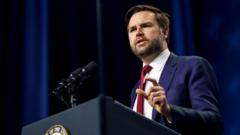JD Vance, the Vice President of the United States, is set to journey to Rome this Friday, where he will meet with Italian Prime Minister Giorgia Meloni and the Vatican's secretary of state, Cardinal Pietro Parolin. However, the core aim of his visit isn't outlined on the formal agenda; it is to connect with Pope Francis, a goal that carries substantial political and symbolic significance in light of Easter festivities. Sources indicate that Vance, a dedicated Roman Catholic who converted in 2019, is eager for a brief audience with the 88-year-old pontiff. Such an encounter could symbolize a warming of relations between the Vatican and the U.S., particularly considering recent strains regarding issues like migration and moral leadership.
Father Roberto Regoli, a history professor at the Pontifical Gregorian University, notes that a meeting between Vance, an influential layman, and the Pope, a leading religious figure, would bear immense importance. With the Vatican not confirming any arrangements for an informal meeting, speculation grows about what a failure to connect might imply regarding Vance's standing with the Church or the Pope's health. After a recent health setback, Pope Francis has gradually resumed outings, having made unannounced visits, including a brief meeting with King Charles III.
A photo op with the Pope would undoubtedly mark a significant victory for Vance, enhancing his public image while exemplifying Pope Francis's inclusive ethos — welcoming diverse political views. Conversely, should the meeting not occur, it could trigger discussions around perceived dismissals or potential health concerns about the pontiff. However, indisputably lined up is his anticipated encounter with Meloni, who shares the U.S. administration's stringent migration policies. Meloni, who recently met Donald Trump, is seen as a key ally, and their meeting will further elucidate Vance's intentions to cultivate ideological partnerships across Europe.
Since his controversial address at the Munich Security Conference, where he criticized European leadership on free speech and migration, Vance aims to mend frayed ties, not just with Meloni but other senior Italian officials. This backdrop is indicative of a delicate relationship characterized by contrasting viewpoints on immigration policies between the Vatican, which advocates for compassion, and the U.S. administration. In a letter to U.S. bishops, Pope Francis articulated his concerns over immigration tactics that he believes undermine human dignity, a viewpoint likely opposing Vance's political positions.
Reflecting on his spiritual journey, Vance’s late conversion to Catholicism, prompted by a search for moral grounding amidst societal issues highlighted in his memoir, resonates with the nuances of this political-religious dance. As Vance navigates critical appointments in Rome, the outcome of his aspirations to meet with Pope Francis may prove pivotal, influencing perceptions of his political and personal identity in the context of his faith within the contemporary landscape.
Father Roberto Regoli, a history professor at the Pontifical Gregorian University, notes that a meeting between Vance, an influential layman, and the Pope, a leading religious figure, would bear immense importance. With the Vatican not confirming any arrangements for an informal meeting, speculation grows about what a failure to connect might imply regarding Vance's standing with the Church or the Pope's health. After a recent health setback, Pope Francis has gradually resumed outings, having made unannounced visits, including a brief meeting with King Charles III.
A photo op with the Pope would undoubtedly mark a significant victory for Vance, enhancing his public image while exemplifying Pope Francis's inclusive ethos — welcoming diverse political views. Conversely, should the meeting not occur, it could trigger discussions around perceived dismissals or potential health concerns about the pontiff. However, indisputably lined up is his anticipated encounter with Meloni, who shares the U.S. administration's stringent migration policies. Meloni, who recently met Donald Trump, is seen as a key ally, and their meeting will further elucidate Vance's intentions to cultivate ideological partnerships across Europe.
Since his controversial address at the Munich Security Conference, where he criticized European leadership on free speech and migration, Vance aims to mend frayed ties, not just with Meloni but other senior Italian officials. This backdrop is indicative of a delicate relationship characterized by contrasting viewpoints on immigration policies between the Vatican, which advocates for compassion, and the U.S. administration. In a letter to U.S. bishops, Pope Francis articulated his concerns over immigration tactics that he believes undermine human dignity, a viewpoint likely opposing Vance's political positions.
Reflecting on his spiritual journey, Vance’s late conversion to Catholicism, prompted by a search for moral grounding amidst societal issues highlighted in his memoir, resonates with the nuances of this political-religious dance. As Vance navigates critical appointments in Rome, the outcome of his aspirations to meet with Pope Francis may prove pivotal, influencing perceptions of his political and personal identity in the context of his faith within the contemporary landscape.






















